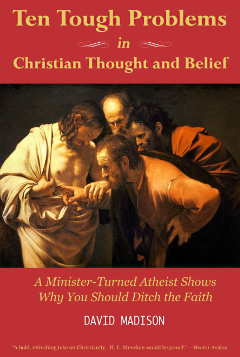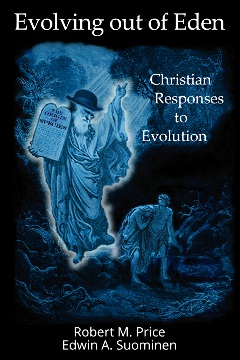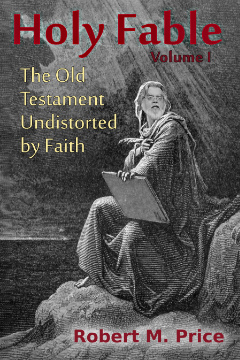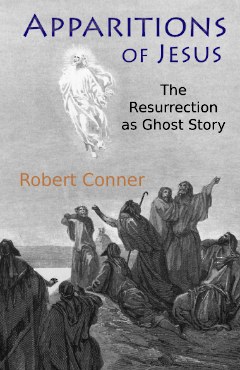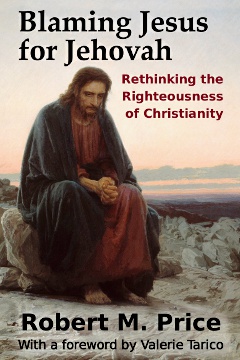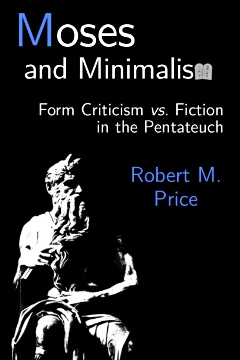The Bold Testament: Abraham’s Excellent Adventure
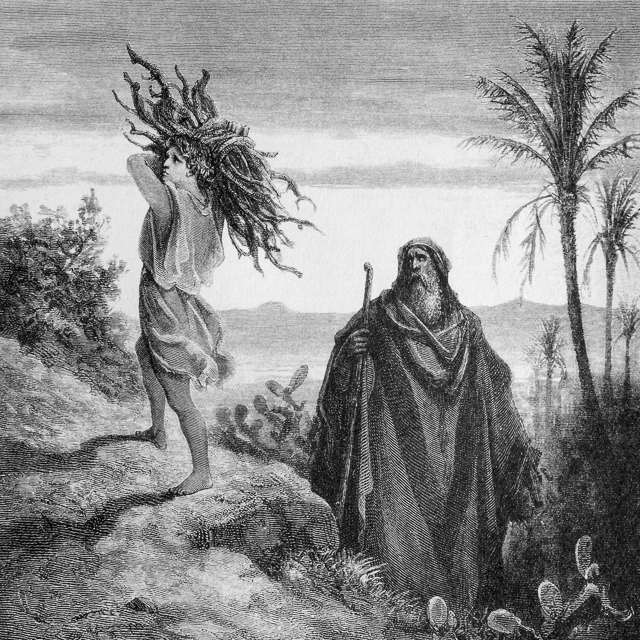
The noises were starting again, growling and coughing in the darkness. Panic crawled up Abraham’s arms and shook the calm of the cool desert night loose from his mind. He jerked his head, instinctively, to spot the source of the deep breathing, impossibly loud and menacing, the low voice that rumbled accusations and threats. But he knew nothing would appear, even if there’d been any light beyond the dying fire’s last shadows.
He had never found a body behind this voice. He turned his head again, pointing his nose toward the chorus from an unseen pack of jackals that howled over a kill somewhere in the hills, balancing the sound between his ears. The voice was different, not much louder but coming from all around him, everywhere yet nowhere, taunting him just the same no matter where he turned.
Unclean. Faithless. Weakling. The angry words echoed and slurred, as that monstrous breathing came and went, thumping with the racing of his heart.1
“Not so soon, no!” Abraham kept the plea a silent one. He didn’t want to disturb the others sitting at the fire. Nor did he care to add the sound of his own small voice to all that he was being forced to hear. He was supposed to be awed by these encounters, but he hated them.
During the day, his people–respectful men and pretty young women with quiet smiles–gave attention and obedience to everything he told them. But then at night, way too often now, this disembodied voice came along with its sneers and insults and demands, smothering him under the superior power of a presence he could not fight or even see. It was the one voice out here that reminded him of his insecurities, that dared tell him plainly, without the deference owed to a holy man, what he was: just another quivering mortal who never quite fit in with the rest of them.
Faithless. Faithless. Faith–lesssss. Weak–lingggg. Unclean. The words kept sweeping in.
He lifted Isaac off his lap, slowly and gently, and wiped the cool sweat of a child’s early sleep from the boy’s hair. He wadded up some of his cloak and placed Isaac’s head onto it, then leaned forward, his own head in his hands, and closed his eyes. “Just go away, would you?” he begged, his mouth forming the silent words with no voice or hope to them.
The coarse fabric of his tunic sleeves slipped down his forearms, and he tried focusing on the warmth that fell on his skin there from the low flames, the smell and crackle of the wood, the yip and howl of the jackals. Anything but this insistent groaning and muttering from his father’s God. He did not want to hear from Yahweh tonight.
That’s who the voice was, of course. Who else could it be? Adam and Noah had spoken with Yahweh, the scripture of the old ones said. With his own eyes he’d seen his withered father rocking back and forth, nodding and listening to the voice. Years ago, Abraham had begun hearing it himself, shouts that startled him as he was trying to fall asleep.2
He was still a young man then, and Yahweh for his own unsearchable reasons waited a while to start forming any words from the sounds. When he did, they were not pleasant words. Then they strung together into sentences and terrified him and made him wish he could hear nothing but the ordinary noise of life around him. That’s all his mother said she ever heard.
When his father died, the voice of Yahweh finally spoke clearly. Guttural noises and breathing still accompanied the words, but Abraham could understand. Go. Go. From your father’s house. Weakling. Go. Your Father’s house. To a land. Unclean. A land. I will show you. I will shhhh–show you. Go, the voice had said.3 There was nothing he could do but obey. And so here he was, out in the desert between the hills with his followers, his wife, listening at night to the fire and the jackals and this haunting, dreaded voice of a hidden God.
Weakling. Your son. Faithless. Your son. Isaac, your son, the voice said. Abraham looked down at his sleeping boy. Isaac. Faith–lessss. Isaac.
“Him? What do you want?” He did not contain his own voice this time, and it cracked, sounding weak and small in the darkness.
A couple of men still at the fire looked up from the flames, stood, and walked toward their tent with bowed heads. Father Abraham was speaking with Yahweh and needed to be left alone. There was nothing for them to say, nothing to do but immediately and respectfully withdraw from his presence. He might instruct them tomorrow, or not.
Isaac. Your only son. Faithless. Faithless. Isaac.
“Here I am. What do you want to tell me about Isaac?” Abraham pushed down a flare of anger that was flashing in his mind along with the old fear. It’s annoying enough to continue the insults after all these years, he thought, and now you have to mix my son’s name in with it? Isaac’s body was warm against Abraham’s on the cloak, huddled close to him against the cool air.
Burn him. Burn him. Faithless. Isaac. Your only sssss–son. Burn. Burn.
He shook his head, anger and panic exploding together inside it now. He picked up Isaac, hesitating over his son’s limp weight as he shifted it to one arm so he could pick up his cloak with the other. The boy was getting too big to carry, but he was not ready to stop doing that yet. Burn him. Faithless. Burn him. Isaac, the voice said again, as Abraham shook the dust and thorns out of the cloak and draped it over one shoulder and carried his son into his tent.
The voice repeated its loathsome new message about Isaac the following night, and the one after that. On the next bleak morning, early, Abraham awoke and left the comfort of his place next to Sarah’s sleeping body and stepped carefully over Isaac’s. He went and stood in front of the stones circling the black heap of ash from all their fires and dared the voice to speak.
But now he was in daylight. He could see the hills and feel the warmth of the sun and its brightness was all around him. The voice seemed diminished during the daytime, and it would probably leave him alone until dusk at least. He moved his eyes along the jagged outline of the landscape until they fell on the high place of sacrifice.
Yes, he decided, there would be one today. A goat would bleed and burn and his people would be reminded what kind of a God they had. And, he dared to hope, Yahweh might be appeased.4
In the livestock pen, he noticed a few raised eyebrows as he announced the bad news about their stud goat. But nobody would say a word against it. Abraham himself did the honors up on the hill, holding the goat’s head with one hand as he slashed the knife deep across its throat with the other. If there were a meeting tent, they’d be doing this at its doorway, Abraham thought. Like things were supposed to be.5 But none of their tents was big enough for even a fraction of them all. His people just sat around the fire ring whenever he spoke to them, as the mothers tried their best to keep the little boys from poking around for embers still hot.
One of the younger Disciples put a bag by the goat’s neck to catch most of the blood spurting out there, then Abraham opened a big vein and they collected more. Then the Disciple handed it over, bulging and dripping, but Abraham flicked his fingers around and nodded: You do it. The kid held the top of the bag with one hand and tipped it sideways with the other, splashing the blood on the rocks of the altar.6
Abraham got to work skinning the dead goat and pulling out the guts, slopping the mess into a pail. Wash them with water, the instruction went, for some reason that eluded Abraham completely.7 They tried not to waste water here, and the guts were going to burn along with everything else anyhow. But he dutifully sloshed everything around and held back the warm wet pile with his hand as he tilted and drained the pail onto a small aloe vera struggling to grow near the rocks. Help something live a full life here, he thought.
Then, as everyone stood there being quiet and attentive, he commenced hacking away at the pink, vaguely goat-shaped mass that lay on the ground. Cut it into pieces, the old tradition instructed, with the head and the fat.8 There wasn’t much fat on this particular beast, living out here. Cutting it up as prescribed was tiring work and his back hurt from bending way over.
Why didn’t someone pile up a few rocks next to the altar, too, to make this part easier? Probably because they hardly ever made the offerings anymore. They needed to eat all the meat they could get from these animals, not burn it. The waste of the whole ritual nagged at him as he knelt and cramped and sawed on what should have been goat steaks, bearing down hard with his knife and taking way too long for any sense of reverence to linger.
Finally there were enough separate pieces to satisfy him that protocol was being observed. A couple of Disciples had stacked wood on the altar while he was working the carcass. He stood up and stretched, and they piled the chunks of meat on the rocks.
And it sure smelled good, except for the guts, he thought after the fire was lit and the smoke was floating upward toward where Yahweh presumably sat sniffing away. He was finding it harder to keep a cloak of piety draped over his anger and frustration about the Isaac threats. Why did Yahweh need to bring his son into it? He hoped that this goat, the best one they had, would help appease the demand for sacrifice. It really had been a while since they did their last one, too long he supposed.
But that night when the voice grunted and breathed, it said, Isaac. Your son. Burn him. Your son. Faith–lessss.
Abraham argued with the voice for another week, but he knew how this story had to go. As he would try to explain later, his God demanded all the firstborn, from man to beast. “They shall be Mine,” Yahweh said in the scripture, “I am the LORD.”9 Abraham hated this old system–even the waste of a good stud without so much as a hunk of meat when he’d tried getting by with just the goat. He fought it, he questioned it, he wept in his tent as Sarah wondered what burden he was carrying this time. But ultimately, he knew that the voice would win. It always did.
Thankfully, his wife never heard the voice. Not that a woman could be expected to speak with Yahweh, of all things, but their father’s sister had claimed to hear some of the mysterious sounds, too.10 Shrieking, coughing, and so forth, though she never described any real words. Sarah did not suffer directly, but had helped to care for their aunt in her worst moments, and now she stood by without prying as Abraham suffered his. That was good; what he had in mind for their son was not something he could share ahead of time.
Sarah was a devoted woman in the group. She’d been willing, honored even, when he asked her to be his wife, despite being kin. She wore with pride the name he gave her as he took his.11 She had even suggested he also take sex from one of the others to propagate his seed.12 But now she was a mother, too, and this wouldn’t be an easy thing for her to accept.
He was up early again, saddling one of the wild burros they’d captured from the desert. To the hill. The hill. I will shhhh–show you, the voice had said last night.13 All he knew is that they would head north, toward the jagged line of hills he looked at every morning after listening to jackals somewhere out there the night before.
A couple of young Disciples were coming back from the woodpile with wood for the fire they’d need when they got to whatever hill Yahweh had in mind.14 Abraham fastened the cinch and scratched the burro’s long ears and almost smiled as he looked at the two of them leaning back to balance their awkward loads of spindly little logs.
They were good obedient kids. When he woke them this morning and said they’d be going with him on a trek into the hills, their response was just what was expected, “Yes, Father Abraham.” But hearing it still pleased him. They were devoted and faithful, and they were somebody else’s sons. Why couldn’t the voice have asked for one of them instead? He wasn’t sure what to do with that thought–shameful, maybe, but why did Yahweh have to come along and demand something so precious to him? Wasn’t there some shame up there, too?
He picked up Isaac and held him close for a second and then set him on the saddle. There was a big blanket underneath it and the burro had a long back. So Abraham tied up the logs in a bundle with a good length of rope and heaved them up behind Isaac. The boy could lean against the logs when he got tired. Rest your body on the wood, my son, he thought, fighting off another wave of anger at his God of sacrifice.
The burro balked at the added load, snorting and stamping in the dirt. Abraham muttered softly to it–a lot more pleasantly, he thought, than the voice ever did to him–as he tied the bundle to each side of the saddle cinch. Then he groped yet again with his right hand to confirm the solid hard weight of his knife at his hip and nodded to the kids. He did not look back at his tent where Sarah still slept as they headed out from the camp.
Their water was just about gone by the time they got to the hill that Abraham decided was Moriah. The voice hadn’t said anything more specific last night, or the night before, but enough was enough and this was the place. He looked up at the hill and figured where the easiest walk might be to the top.15 Then he went back to the big acacia tree where Isaac and the Disciples lay dried out and exhausted.
He stood there in the shade for a minute, digging his toes into the cool coarse sand of the wash and scratching at the burro’s sweaty fur where its saddle blanket had been. The two kids opened their eyes and sat up.
“Stay here with the donkey,” he said. “Isaac and I will go over there.” He pointed to the hill. “We will worship and return to you.”16 He liked the comforting sound of the familiar old words as he spoke them, but what was the reason for the lie? These kids were too well trained in the Discipleship to object, no matter what he told them he was going to do. And they were in no condition to do anything about it anyhow.
They were all dehydrated, even though it was only February and the desert wasn’t getting hot yet. But it sure was dry, not a trickle in the wash. He knelt down and touched Isaac’s cheek, wiggling his head. “Get up, my little son,” he said, and pulled up the boy and held him close and mussed his hair. “We’ll be back in a few minutes. Maybe half an hour,” he said to the kids and they nodded without saying, “Yes, Father Abraham,” because their throats were parched.
The hill wasn’t that big, just a little steep in places. The two of them carried the wood to the top on their backs, tied with lengths of rope cinched around their chests like the saddle had been around the burro. It was important for Isaac to carry some, but his was a much lighter load. Abraham touched his knife yet again, feeling it still there as hard and cruel as the voice that was commanding him to use it.17
He untied his cinch and then Isaac’s. They dropped their wood on a passable clump of rocks that would do for an altar. Abraham stood up and stretched. Isaac was looking at the logs piled there on the rocks, finally figuring out what they were doing. This was obviously a high place. He said, “A burnt offering? Didn’t we just sacrifice one?” Abraham nodded. “So,” said Isaac, “where’s the goat?”
“Yahweh will provide one,” Abraham said. He tugged his rope all the way out of the log pile, holding one end while he flicked loops out and back, coiling it all up neatly in his left hand. He went behind his son and hugged him again, grabbing some coils off the rope with his right hand and wrapping it, quickly, around the boy’s arms and chest.
“Hey!” Isaac shouted, his voice balanced uncertainly between fear and the half-laughing mock indignation of a boy playing rough with his dad. Abraham put another big loop around him and then wound the rope around his wrists, wrapping them together behind his back. He tied it all off with a square knot, quick and permanent, no bights on the second half hitch. “Father, stop it!” Isaac cried, his voice rising to a squeak, uncertain and upset. “That hurts!”
Abraham held onto the rope and grabbed the other piece that had been Isaac’s cinch, pulling it free of the logs and clumping it on the ground. He pushed the logs around with his free hand to flatten the pile. Isaac was struggling now as well as shouting, and Abraham knelt to pick him up, his right biceps locked hard underneath the knees to draw the legs close and keep them from kicking.
He heaved the boy’s wiggling body up and tottered there for a second trying to keep his balance under the squirming load. Isaac pushed his legs hard against Abraham’s right arm. The other arm cradled his head, which Isaac shook hard from side to side as he tried to break free. He got his mouth up to Abraham’s chest a few times, managing to bite through the coarse fabric of his father’s filthy tunic.
Abraham set his burden on the wood. The boy cried out as his weight pressed onto jagged points of the gnarled little logs. Abraham looked down at his arms bulging with the effort of holding the boy down. They seemed like the logs themselves: bent brown things, unfeeling, inflicting senseless cruelty on his son. He watched and listened to the boy crying in pain and panic and fighting helplessly against a father he’d loved and trusted.
Were these arms really his own? How could they be? A brief hot image blew onto Abraham of his beloved Sarah fearing and wondering back at the camp. “Why?” she would scream at him when he returned, and what would he give as an answer?
He could not look, he could not think. He leaned his weight onto Isaac to hold him there and grabbed the other piece of rope. He looped it around Isaac’s legs and pulled them tight to the boy’s midsection. He tied it all off as fast as he could and then rolled Isaac to the side to relieve some of the weight on his little back.
There was a wet redness on one of the logs where a broken-off twig had left a sharp little stump. Isaac’s back had a red spot, too, Abraham saw with horror, from that stump cutting into it. Innocent blood, with more to follow. The shock of seeing it made him yell out a roar of his anger at Yahweh and his own weight that had pressed the boy’s back harder onto these sharp logs and added to all his undeserved pain.
Isaac screamed louder still, above the noise from his father, and kept thrashing his head–thunk, thunk, hard and loud against the wood. Abraham knelt on the rocks and turned himself square to his son, his sacrifice. Jagged edges of the rock cut into his knees and he lingered for a second on the flashes of pain, there and on the bites around his nipple, a little communion of suffering in these last moments with his boy.
Another flash hit his mind above all the rage. What kind of a sick system is this? Doubt, panicked doubt. Could he be wrong? Did he dare question the words of Yahweh, his almighty and angry God, which had been conveyed so powerfully to him in the sacred writings and the voice? And the boy screamed and screamed.
No. He must do it. He held Isaac’s head down with his left hand and reached for the knife with his right. He shall lay his hand on the head of the burnt offering, the writings said, that it may be accepted for him to make atonement on his behalf.18 He drew the knife up out of its scabbard and set it against the pulsing skin of Isaac’s screaming throat. And then, as he hesitated at dragging the blade against the flesh, his own flesh, he heard the loud and distinct voice of an angel.
“What the fuck are you doing?” shouted Miguel-Angel Garcia, lining up his 9mm Beretta on the head of this whack job holding a knife at somebody’s throat. Yes, it was just a kid on those logs, probably about ten years old and totally freaking out. Understandably.
Miguel-Angel kept his finger light but firm on the trigger and the green dot of the front sight on the guy’s ear. He’d only chambered this thing out in the field twice before, to fire off a total of about a half dozen shots for two javelinas in his three Arizona HAM seasons–Handgun, Archery, Muzzleloader. It was a way to get some real use out of the gun besides just having it at his bedside back in Superior where, truth be told, the risk of a home invasion wasn’t that high. Plus he really liked the scenery out here.
The long-haired guy looked up and Miguel-Angel stepped closer, switching to a two-handed grip and feeling the comforting heft of his Berreta with its sixteen rounds in the clip plus one now in the chamber. He would probably get a headshot on the first try at this distance and could squeeze more off fast if he had to. But he couldn’t let the nutcase move between him and the kid or vice versa.
“Put your hands up,” he yelled, wondering how many times he’d heard that line on TV. He hadn’t watched any scenes about a handgun pig hunter doing a citizen’s arrest on someone who was about to slit his kid’s throat out in the desert. I bet these two really do call themselves Abraham and Isaac, he thought. This shit’s fucked up.
The guy croaked, “Yes, please don’t shoot me. Or him.” He took his hand off the kid’s head and raised it in the air and the other one, too, but still holding the knife.
“No way, man, put that hand back down, slowly, and drop the knife on the rocks.”
“Sorry, didn’t mean anything by it.” The knife dropped and bounced, and both hands went back in the air.
“Now stand up and get away from the kid.” The guy complied, almost looking relieved about it. Good–there was a few more feet between him and the kid, and the knife was out of reach.
Miguel-Angel was feeling more confident with his lines now, like he was an actual ranger or cop or something and not a graduate of the ASU School of Social Work who counseled the drunks and druggies and lonely widows of the greater Globe-Superior region. “Kneel down and put your hands behind your back,” he said, authoritatively. The guy did, right away, nodding. No fight at all. The kid was still screaming and crying and doing his best to sit up with his arms and legs still tied.
Now what? It’s not like you carried handcuffs around to hunt pigs. He didn’t have rope or anything. A gutted javelina was small enough to just sling over your shoulder and carry back to the truck. One per open area, two per season.
The rope on the kid. That would have to do. Miguel-Angel went back to a right-handed stance and felt around for the knife. “OK young man, I’m gonna cut you loose now,” he said in his social worker voice, a bit higher and less forced than the one he used on Nutjob, whose bowed head he kept lined up behind the green dot. “That work for you?”
“Y-yeah, sure, yeah,” the kid stammered, then started bawling again. Miguel-Angel found the knife and with his left hand stuck it under the loops holding the kid’s knees to his chest and awkwardly started sawing away. The rope popped free, and he held onto it as the kid tried to stand.
“Just sit down, OK?” he said, “I need to go have a talk with your dad. That is your dad, right?” The kid nodded and sat down on the dirt, well away from this crazy father of his, rubbing his little legs where the rope had held them tight.
So those poor plebes down in the wash with that burro hadn’t just been kidding. He’d come across them lying there in the shade and saw the freezemark on the burro and knew that it wasn’t legal. All they seemed to have on were old brown sacks, with some kind of ratty sandals on their feet. They were skinny and vacant-eyed and all kinds of CPS alarm bells rang in his head as he looked at them. He asked them what was up and one said, “Abraham and Isaac have gone up to that hill to worship” in a weird little voice. That was when he’d heard the screaming start.
Abraham and Isaac, the donkey, the knife, the whole fucked-up Catechism story right here up on this hill. He was probably the only one from Holy Angels School who even remembered it now. Who were these people? He’d read about some cult near the New Mexico border and of course there was the FLDS in Colorado City, but this was a whole new level of crazy.
He went over to Nutjob and stood behind him, trying to figure out what to do with the gun while he tied him up. He put it on safety, still chambered, aiming at the dirt while he pushed the little lever down and watched the red dot get covered up by the lever and then heard the hammer click inertly with no shot ever fired. It almost disappointed him to realize that the Beretta would not be needed for any heroics, though he knew from all his social worker training plus the gun safety class in Globe how stupid of a thought that was. Asshole, he thought as he jammed the gun back into the holster. Using a knife on your own kid, tied up and everything?
“So your name is Abraham,” he said to the back of the filthy head, a real mess in more ways than one, which it seemed he would not be putting any holes in after all. The head nodded. “OK, Abe, I am just going to tie some rope nice and snug on your wrists.”
Abraham muttered, “Yes, yes, fine.” Miguel-Angel got the wrists tied together and then looped the rope around the guy’s waist and cinched everything up tight, tighter than necessary. Abraham did not flinch at that. Nor did he when Miguel-Angel pulled him up and turned him around to look him in the eyes and confront the bastard and possibly let loose a well-deserved punch if he put up any resistance.
But he didn’t. Not a bit. Abraham looked steadily at Miguel-Angel, his eyes wide and happy and a smile showing through his tangled mass of mustache and beard. “I was faithful,” he said, looking upwards then closing his eyes that were now leaking tears. “I was strong, and I was faithful.”
A Conversation with Seth Andrews
SA: We are told quite often that the Bible is an exciting book. And I think to myself, well, you know, it’s interesting, not for the reasons that many pastors and apologists say it is. But it’s in many ways interesting. But in other ways, many of the stories, even in the way they’re told, don’t really give you three dimensions.
ES: Yeah, they just describe all these horrible things with a few paragraphs. You know, “Oh, well, ten thousand people died of the sword.” And then they move on to the next verse and it’s just like, “Well, whatever.”
SA: And we get used to that type of stuff in the church. We’re like, “Oh, you know, thousands were slaughtered. Next!” And you don’t really create the visual picture of the death of men, women, children, animals, blood in the streets, pandemonium, chaos, those types of things. And in the writings that you’ve done, you’re very good at taking us down that road.
ES: Oh, thanks. Yeah, I try. I think that’s one of the things that, when I read the Bible for the first time–you know I’m in my forties, a slow learner like you, in my forties reading the Bible, finally, from Genesis 1–and every day I sit down and I’m looking at this, “This is horrible! I never heard about this stuff!” I taught Sunday School, you know, and I never heard about any of this stuff because it was always cherry-picked. I did it, the preachers did it, but here it is.
SA: I’m amazed at how I used to admire Abraham. What an awesome dude! What an amazingly obedient man. A servant of God who was prepared to sacrifice so much to show his allegiance to Yahweh. What an amazing story of love and happiness and joy. And look, there’s a happy ending, right? The angel stayed the blade so that Isaac’s life was spared and they killed an animal instead. It’s so beautiful! And now I think, “That’s jacked up!”
ES: Yeah. There’s a Father’s Day sermon that was given in my old church three years ago that really irked me because it was celebrating the near-sacrifice of Isaac. It was celebrating the faithfulness of this man. I just . . . Here’s just one example of what this guy said: “Do you think he saw plainly what going to happen? No way! He didn’t. He had to take this leap of faith. He had to kind of shut down his thinking. He could not think.” But then he praises him for not thinking. “Faith was the most important matter.” Well, he was about to slaughter his son and we’re praising that! It’s just insane.
SA: When I speak to many people inside the Christian Church, I’ll ask them the question: “So if Yahweh appeared to you as he did to Abraham, and he asked you to sort of commit an act of obedience sacrificing, by knife, one of your children, would you do it?” And they kind of go glassy on me. You know, they just sort of go, “Well, yah, God wouldn’t . . . he hasn’t done that for . . . we’re under the New Covenant, blah, blah . . . ”
ES: Right.
SA: “OK, yeah, yeah, fine, I’m not talking about that. I’m talking about if you were alive during Old Testament times under the Old Covenant, God came to you . . . or if he came to you in five minutes, you know, you’re supposed to be obedient no matter how you slice it. And historically it has been shown in Scripture: Yahweh does this kind of thing. If he was to come to you and say, ‘Look, I need you to kill one of your kids as an act of obedience,’ would you do it?” They literally just flip out, they shut down, or they come up with some sort of excuse about how, well, “Abraham really knew, maybe, under the skin that he wouldn’t have to do it. It was all a charade. The act itself had some kind of different meaning.” We equivocate, right? And then if you ask them to specifically choose one of their children . . . “All right if you had to choose one of your kids? How many do you have? Four? Oldest, youngest, middle child, the one that’s giving you the most trouble these days? Which one do you choose?” And it’s almost like they’ve taken themselves out of the Bible story in some way. And they’re not seeing it the way it truly is. Have you encountered that, Ed?
ES: All the time, yeah. It’s almost like when they talked about the Bible stories, we were talking a different language. I know you talk a lot about Noah’s Ark and you see the cute animals standing there, the giraffe and so on, and it’s the children’s book version of it. But when you really think about the actual story–and you do a good job of dramatizing that with the screaming people in the water, gasping for breath–that’s what really happened. But we just think, for some reason, we just think on a different level about all of this stuff when it comes to church.
SA: Let’s come back to the climax of the story that I just read on the radio.
ES: OK.
SA: It’s a total left turn.
ES: Heh heh.
SA: It’s, “Whoah, hey wait a minute!” It’s almost an M. Night Shyamalan kind of a thing. You’re cruising along, you’re in this world, you’re doing this thing, you’re in the mind of the character. And then–wham!–you pull the rug out from underneath us and you go a whole other direction. Tell me about that, would you?
ES: Oh yeah. I wanted to do that. I wanted to have the reader just kind of going along, immersed in that world, that ancient time, but maybe a few hints here and there that it wasn’t quite the same story. And I wanted that to be parallel so that they would be able to go along with the old story and then, once that left turn happened, then realize, oh wait a minute, all this stuff was the nut job out there with the cult in the deserts of Arizona. All of that lined up. That was to bring the point home that this crazy stuff that you were sort of swallowing as you read it, well, just imagine that now, in the deserts of Arizona in the 20th century with some crazy guy. And you would immediately switch your viewpoint from saying, “Well, that’s a holy man, he was being guided by God to do this thing,” and somehow it was sacred at the time. Well, now, in the 20th century, you suddenly look at this and you’re looking at this guy in a very different light. But it’s the same exact thing happening.
SA: He stumbles upon someone, a random guy–a random stranger stumbles upon him, and realizes the voices in his head told him he needed to kill his children. And immediately you think of half a dozen headlines, horrifying headlines that you’ve seen where this has happened. Someone drowns their children in a bathtub or does some other unspeakable thing to a child because they believed some invisible “other” commanded them to do so, and it’s genuinely terrifying.
ES: Sure. Sure. And then it also lets you look back and say, wait a minute. Some of the explanations for these Bible stories–you can start to think, you know, these guys actually were hearing voices. Really, they’re sitting around in the desert out there in a low-stimulus environment, herding their goats and whatnot. There’s a lot of opportunity for them to hear things and to imagine they’re hearing things.
SA: You have any other stories along this line? You’ve done some writing, obviously, with Robert Price. You guys wrote the book Evolving out of Eden. And we read a short story of yours. I can’t even think of the podcast name.
ES: Yeah, you did the first part of “Jehu’s Jihad.”
SA: That’s right. That’s right.
ES: Which got a lot of readers, thanks to that, reading the entire story on my blog. So that was a lot of fun. I have thought of a few other ones that I’d like to put into print. One about when you’re showing up at the gates of heaven and that’s not quite what you think. And you’ve mentioned this, too, before, about how heaven would get really boring after a while, no matter how good it was.
SA: An eternity of kissing God’s ass, right? Holy, holy is the Lord God almighty who was and is and is to come. (Yawn.)
ES: Exactly! So let’s take that to its logical conclusion and see what happens. And some of these other horrible Old Testament stories, there’s plenty of fodder there. In the New Testament, some of the contradictions would be a lot of fun to explore, with, uh, Jesus appearing to the disciples. “Wait a minute, he appeared here! No, actually, he appeared here! Well, he left after a short period of time. No, he stuck around for 40 days. Well, there’s again a lot of opportunity to imagine how that might have happened, the two authors sitting there squabbling about their story. Yeah, there’s plenty of fodder for it. It would be a fun project.
SA: You know, if rationalists had gone back and rewritten the Bible–maybe it’s been done, I don’t know–it’d be a lot more interesting read.
ES: Yeah.
SA: I think it would probably be a lot more sobering, which is saying something because it’s already kind of a sobering text. Ed Suominen–thanks for letting me read your story on the radio, it’s kind of a nice change. Ed, I know you do a lot of writing, or you used to. You still have your [personal] website, and what is it?
ES: edsuom.com
SA: Ed, good stuff. Thanks for making it part of the broadcast this week.
ES: My pleasure, Seth.
Notes
-
Audet, Gabriel. “Auditory Hallucinations–An Audio Representation,” YouTube (2014), youtu.be/JTUEX5ZkzIU. ←
-
A Reddit user yerjam recalls that “it started with screaming. I would hear a male voice scream while I was trying to sleep; it would sound like he was in some sort of pain and agony. I was extremely disturbed for a long time and couldn’t tell anyone. Eventually a male voice began talking to me.” ←
-
Genesis 12:1 (“Go forth from your country, / And from your relatives / And from your father’s house, / To the land which I will show you”). ←
-
W.G. Hardy explored the idea of a tortured Abraham first trying his luck with an animal alternative in his novel Abraham, Prince of Ur, Dodd, Mead & Co. (1935). ←
-
Leviticus 1:3 (“If his offering is a burnt offering from the herd, he shall offer it, a male without defect; he shall offer it at the doorway of the tent of meeting, that he may be accepted before the Lord”), 1:5 (“He shall slay the young bull before the Lord; and Aaron’s sons the priests shall offer up the blood and sprinkle the blood around on the altar that is at the doorway of the tent of meeting”) ←
-
Leviticus 1:5 ←
-
Leviticus 1:13 (“The entrails, however, and the legs he shall wash with water. And the priest shall offer all of it, and offer it up in smoke on the altar; it is a burnt offering, an offering by fire of a soothing aroma to the LORD”). ←
-
Leviticus 1:8 (“Then Aaron’s sons the priests shall arrange the pieces, the head and the suet over the wood which is on the fire that is on the altar”). ←
-
Numbers 3:13 (“For all the firstborn are Mine; on the day that I struck down all the firstborn in the land of Egypt, I sanctified to Myself all the firstborn in Israel, from man to beast. They shall be Mine; I am the LORD”). ←
-
They were indeed half-siblings, Genesis 20:12. ←
-
Genesis 17:5 (“No longer shall your name be called Abram, (“But your name shall be Abraham; For I have made you the father of a multitude of nations”), 17:15 (“Then God said to Abraham, “As for Sarai your wife, you shall not call her name Sarai, but Sarah shall be her name”). ←
-
Genesis 16:2 (“So Sarai said to Abram, ‘Now behold, the Lord has prevented me from bearing children. Please go in to my maid; perhaps I will obtain children through her.’”). ←
-
Genesis 22:2 (“He said, “Take now your son, your only son, whom you love, Isaac, and go to the land of Moriah, and offer him there as a burnt offering on one of the mountains of which I will tell you”). ←
-
Genesis 22:3 (“So Abraham rose early in the morning and saddled his donkey, and took two of his young men with him and Isaac his son; and he split wood for the burnt offering, and arose and went to the place of which God had told him”). ←
-
Genesis 22:4 (“On the third day Abraham raised his eyes and saw the place from a distance”). ←
-
Genesis 22:5 (“Abraham said to his young men, ‘Stay here with the donkey, and I and the lad will go over there; and we will worship and return to you.’”). ←
-
Genesis 22:6 (“Abraham took the wood of the burnt offering and laid it on Isaac his son, and he took in his hand the fire and the knife. So the two of them walked on together”). ←
-
Leviticus 1:4. ←

